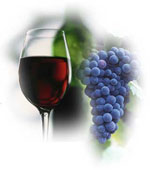It’s cold out there, so here are some tips to get ya hot...

One of the principal elements in wine is alcohol. Alcohol is not only a mood enhancer, but provides weight and a pleasantly warm, sweet sensation over your palate. Alcohol also sends blood to the surface of your skin, kickstarting your circulation to create a warming effect.
Because of that rush of blood to the skin, science says alcohol actually causes the body to lose heat. Who cares? By then you’re indoors, warm and cozy sitting by the fire, savouring hearty, winter food. This is why we prefer higher acohol wines in winter. Alcohol has the effect of being "filling" as well: you feel satisfied faster and your tummy feels warm. It’s just what we need when it's bloody cold outside!
Choosing wines for the season is therefore just as with food: we eat fresh, lighter dishes in the summer and more substantial foods in the winter. Red wines in general are more full-bodied and flavorsome than whites. They’re also served at room temperature, or just below. Plus, there's a component in red wine that makes it compatible with richer, meat-based dishes: tannins. Tannins come from the maceration of red grape skins and seeds, and are essential to the ageability of red wine. Without tannins not too many reds would benefit from cellaring. Tannins are also anti-oxidants and slow down the ageing process in us humans, apparently – just look at me.
Not that whites aren’t allowed, but the same logic applies. Choose robust whites, which are better off poured at cellar temperatures (14-16 degrees Celsius) anyway - not too cold. This lets the flavours expand. It’s physics after all: remember from school what happens to metals when they’re cold or heated.
When it comes to the origin of these higher alcohol, winter-friendly wines, search for wines from warm regions. The Southern Hemisphere is a good starting point, but also the South West of France, southern Italy, warmer areas of the Iberian Peninsula, or wines from hot weather vintages. Italian Amarones are classic winter wines, as they’re made from partially dried, raisinated grapes. This process increases sugar levels and therefore alcoholic content. But hot weather in general increases the ripeness of the grapes, resulting in more sugars. These sugars are what gets converted into alcohol through fermentation.
So, when the thermometer’s mercury stars dropping, think of serving wines with a fuller weight, with more alcohol and lots of flavour."

 One of the principal elements in wine is alcohol. Alcohol is not only a mood enhancer, but provides weight and a pleasantly warm, sweet sensation over your palate. Alcohol also sends blood to the surface of your skin, kickstarting your circulation to create a warming effect.
One of the principal elements in wine is alcohol. Alcohol is not only a mood enhancer, but provides weight and a pleasantly warm, sweet sensation over your palate. Alcohol also sends blood to the surface of your skin, kickstarting your circulation to create a warming effect.